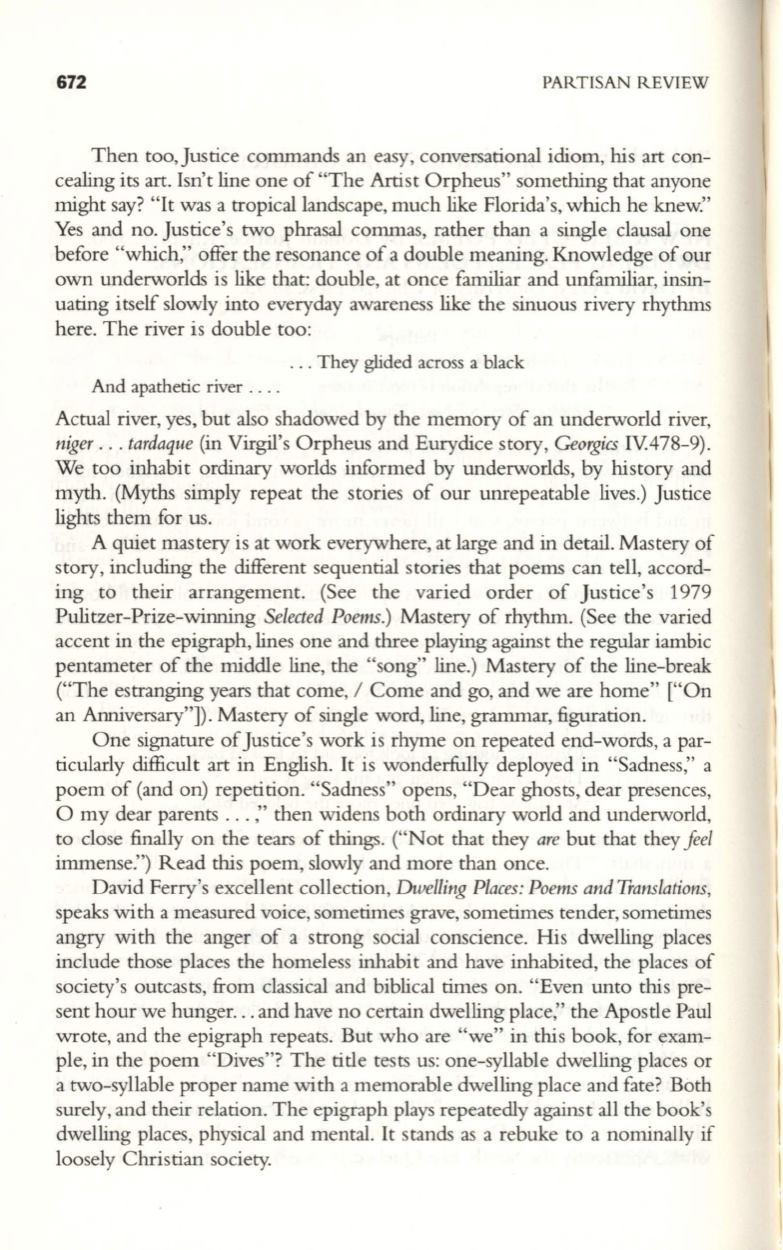
672
PARTISAN REVIEW
Then too, Justice commands an easy, conversational idiom, his art con–
cealing its
art.
Isn't line one of "The Artist Orpheus" something that anyone
might say?
"It
was a tropical landscape, much like Florida's, which he knew."
Yes and no. Justice's two phrasal commas, rather than a single clausal one
before "which," offer the resonance of a double meaning. Knowledge of our
own underworlds is like that: double, at once familiar and unfamiliar, insin–
uating itself slowly into everyday awareness like the sinuous rivery rhythms
here. The river is double too:
.. . They glided across a black
And apathetic river ....
Actual river, yes, but also shadowed by the memory of an underworld river,
niger .
. .
tardaque
(in Virgil's Orpheus and Eurydice story,
Georgics
IV478-9).
We too inhabit ordinary worlds informed by underworlds, by history and
myth. (Myths simply repeat the stories of our unrepeatable lives.) Justice
lights them for us.
A quiet mastery is at work everywhere, at large and
in
detail. Mastery of
story, including the different sequential stories that poems can tell, accord–
ing to their arrangement. (See the varied order of Justice's 1979
Pulitzer-Prize-winning
Selected Poems.)
Mastery of rhythm. (See the varied
accent in the epigraph, lines one and three playing against the regular iambic
pentameter of the middle line, the "song" line.) Mastery of the line-break
("The estranging years that come,
I
Come and go, and we are home" ["On
an Anniversary"]). Mastery of single word, line, grarnrnar, figuration.
One signature ofJustice's work is rhyme on repeated end-words, a par–
ticularly difficult
art
in English. It is wonderfully deployed in "Sadness," a
poem of (and on) repetition. "Sadness" opens, "Dear ghosts, dear presences,
o
my dear parents ... ," then widens both ordinary world and underworld,
to close finally on the tears of things. ("Not that they
are
but that they
f eel
irnrnense.") Read this poem, slowly and more than once.
David Ferry's excellent collection,
Dwelling Places: Poems and Translations,
speaks with a measured voice, sometimes grave, sometimes tender, sometimes
angry with the anger of a strong social conscience. His dwelling places
include those places the homeless inhabit and have inhabited, the places of
society's outcasts, from classical and biblical times on. "Even unto this pre–
sent hour we hunger. .. and have no certain dwelling place," the Apostle Paul
wrote, and the epigraph repeats. But who are "we" in this book, for exam–
ple, in the poem "Dives"? The title tests us: one-syllable dwelling places or
a two-syllable proper name with a memorable dwelling place and fate? Both
surely, and their relation. The epigraph plays repeatedly against all the book's
dwelling places, physical and mental. It stands as a rebuke to a nominally if
loosely Christian society.


